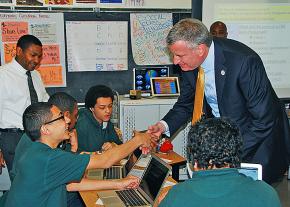Does Bill de Blasio deserve teachers’ votes?
New York City teacher , author of the What's Left in Schools blog, examines the record of Mayor Bill de Blasio on education issues.
BILL DE BLASIO cake-walked to his primary victory last month (bonus points if you even remember the name of his opponent), and it looks like he will trounce his Republican opponent in November (triple bonus if you know their name).
The mayor's narrative is that this is a victory for the working class in New York City, and for progressive politics nationally, as the "class warrior" sallies forth like a knight in shining armor to rescue the damsel in distress from the 1 Percent and Donald Trump. Leftists like Juan Gonzalez have proclaimed the "staggering...financial impact of de Blasio's initiatives on ordinary city residents." The United Federation of Teachers leadership has touted de Blasio as "a partner," who "moved our school system to heights we have never seen before."
The reality, I fear, is quite different. De Blasio has presided over widening income inequality despite his "tale of two cities" rhetoric. He remains committed to "broken windows" policing that disproportionately targets people of color. The basic challenge of his mayoralty has been an unwillingness to break with the real estate interests who backed his election campaign. According to the Wall Street Journal, "the mayor has raised more than $4 million to his 2013 and 2017 election campaigns from real estate officials, their immediate family members or lobbyists for them").

Meanwhile, ordinary New Yorkers are left increasingly disenchanted as their rent increases rapidly while the mayor repeatedly implicated in pay-for-play schemes with the real estate industry, and proposes a housing plan that makes gentrification worse instead of better.
Supporters like Gonzalez cite the $15 billion of contract settlements with public sector unions to prove the mayor's pro-worker bonafides. But this forgets that much of that money was paid out in raises deferred to future years (teachers, for example, will only see a quarter of the money owed this month) and will never be seen by those who leave teaching.
Furthermore, the raises were paid for by billions in health care savings, which members are paying for through increased copays (I have to shell out $50 when my daughter has an infection that needs to be taken to CityMD, because we can't get a pediatrician appointment).
BUT BEYOND the economics, what about de Blasio's record on education? Doesn't having a progressive mayor and chancellor--in contrast to the neoliberal assaults of former Mayor Michael Bloomberg and former schools chancellors Cathie Black and Joel Klein--outweigh whatever weaknesses in other areas?
Hardly.
Even while the testing regime has been forced into a moratorium on the high-stakes use of the Common Core exam results (largely through the efforts of the "opt-out" movement led by parents and students, mostly upstate and in Long Island), testing continues unabated in New York City, with the city focusing on every percentage point increase in reading and math.
Schools Chancellor Carmen Fariña has been just as recalcitrant as Klein on reining in abusive administrators who terrorize staff and students across the city. Fariña was reluctant to take on prominent abusers like Central Park East 1 Principal Monika Garg, for example, who was only taken out of her position after parents started to bird-dog de Blasio's re-election efforts.
De Blasio's vaunted "war" with the charter industry has turned out to be more bluster than reality, as he has been forced into a series of rotten compromises with the charter barons because of his inability to take on Governor Andrew Cuomo.
Even the mayor's signature education campaign item, "Pre-K for All," has been marred by the lack of full unionization at all the school sites, leaving many teachers without a voice in their working conditions or salaries.
All this has taken place while the mayor extends massive lobbying capital in Albany trying to preserve mayoral control, in order to prevent local democratic input into the school system or a real, elected school board.
PERHAPS THE single most egregious educational failing of the de Blasio regime on education is tied starkly to the mayor's dependency on real estate money. The mayor has refused to deal with the massive problem of racial segregation in the most segregated school district in the country
Even the simplest of efforts to combat segregation, like lobbying to eliminate the racially exclusive Specialized High School exam, were eschewed in favor of a picayune medley of small reforms. The attitude of the de Blasio administration was neatly summed up by Chancellor Fariña's suggestion that schools interested in diversity should just set up "pen pal" programs with wealthy or whiter schools.
School segregation, of course, is deeply implicated in real estate segregation, and de Blasio's school closings, although nowhere near the scale of Bloomberg's attempts, can be neatly mapped onto the coordinates of gentrification, as schools serving low-income students of color are shut down, making room for schools serving new, whiter and wealthier residents.
Given the bankruptcy of de Blasio's faux efforts at reform, is there anyone to vote for?
Akeem Browder, brother of Bronx teen and Rikers Island victim Kalief Browder, is running a left-wing alternative campaign against de Blasio, on a platform of ending broken windows policing, shutting down Rikers in three years instead of ten, and genuine opposition to gentrification. I would rather support someone who has direct experience with the criminal justice system and homelessness to oppose racial injustice and create affordable housing than a supposedly progressive mayor who has merely been pretending to do so for his entire term.
However, regardless of who people pull the lever for on November 7, it's going to be crucial to have a set of labor and social movements that are independent of the mayor's office. Fighting school segregation, gentrification, homelessness and broken windows policing will require us to be mobilized and not relying on the "class warrior" to do the fighting for us.


